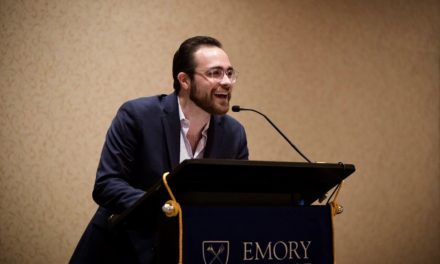Pulitzer Prize winner and Los Angeles Times reporter Sonia Nazario will be visiting campus at the end of this week.
Nazario began her career at The Wall Street Journal and has since earned numerous awards, including a Pulitzer Prize for a 2003 newspaper series that was the basis for her book, Enrique’s Journey – a bestselling novel about a teenage Honduran boy who took a treacherous trip to America to find his mother.
Nazario not only shadowed Enrique for weeks but also spent months retracing his trek, much of it atop freight trains while facing bandits, corrupt cops and gangsters.
The book is required reading in numerous high schools and colleges in the United States and has been translated into several languages.
Nazario will speak and sign books in Room 102 of the Center for Ethics Commons at 7 p.m. Thursday for an event called “The American Immigration Battlefield: ‘Enrique’s Journey’ and the Search for a New Path to the Future.” Additionally, she will participate in the “Public Scholarship at the Border: A Conversation with Sonia Nazario,” hosted by Emory’s Center for Women in Candler Library on Friday at 1 p.m.
According to Emory Journalism Program Director Hank Klibanoff, Nazario will also attend and speak at the Emory-hosted Latino Youth Leadership Conference during the weekend.
Before the Emory series, the writer will speak at a Gwinnett County high school event Wednesday evening.
Nazario said in an interview with the Wheel that she spoke to Klibanoff about coming to Emory last summer because she has not spoken in Georgia as much as she has in other states, despite the recent influx of immigrants in Georgia.
“I am hoping that through my talk both about the book and the immigration issue, we can get into more of the substance of the issue beyond the heat,” she said.
Nazario said that at Emory, she will delve into the politics of the issue, specifically addressing why Washington has not found a successful immigration policy. She said she rejects both the liberal and conservative approaches for a more nuanced and pragmatic solution that focuses on what causes people to leave their home nations.
“If you want to hear about an approach that would actually work in terms of reducing the flow of migrants [and] improving the lives of migrants … then you should come to my talk,” she said.
The journalist’s interest in immigration, the subject of much of her work, began in Los Angeles when Nazario learned that her house cleaner left four of her children back in Guatemala. Her cleaner told Nazario stories about long nights of asking her children to sleep on their stomachs to quiet their loud, hungry grumbles. At that point, Nazario decided it was time to write a book.
Klibanoff said he is especially enthusiastic about Nazario’s visit because she represents immersion – or “fly-on-the-wall” reporting – and the many ethical questions that arise with it. Beyond that, he said, the book “touched a nerve in Atlanta.”
“I think the story of Enrique, which gets its vitality and narrative force from her living the life of young people trying to make their way into this country, had a very powerful effect on many people in this country,” he said.
Klibanoff added that the book has received national acclaim, not just because of the story but because of the way Nazario tells it.
He said many other parts of campus were eager to host Nazario’s visit, including the Department of Spanish and Portuguese, the Halle Institute for Global Learning and the Provost’s Office of Community and Diversity.
Part of the reason for this, he said, is that the story cuts into many different conversations.
“[All students] will all come away with messages that address their particular area of interest, but I think [they will also come away with] her policy interests in this country,” Klibanoff said.
Enrique’s life is one story that represents something larger, he added.
“Enrique is part of that national narrative,” he said, “because we’re living among many, many, many Enriques.”
Vialla Hartfield-Mendez, professor of pedagogy in the Department of Spanish and Portuguese, said she has used Nazario’s book in her classes.
“… Sonia Nazario’s excellent journalism and her ability to uncover and fully tell the very compelling story of some of these immigrants helps us all to have a more nuanced picture of life in the United States generally – not only the lives of certain immigrants, but the way in which their experiences are integrally related to life for the rest of the population,” she wrote to the Wheel.
– By Karishma Mehrotra
The Emory Wheel was founded in 1919 and is currently the only independent, student-run newspaper of Emory University. The Wheel publishes weekly on Wednesdays during the academic year, except during University holidays and scheduled publication intermissions.
The Wheel is financially and editorially independent from the University. All of its content is generated by the Wheel’s more than 100 student staff members and contributing writers, and its printing costs are covered by profits from self-generated advertising sales.





congratulations for the beautiful text
como reconquistar http://www.outrachance.com.br/